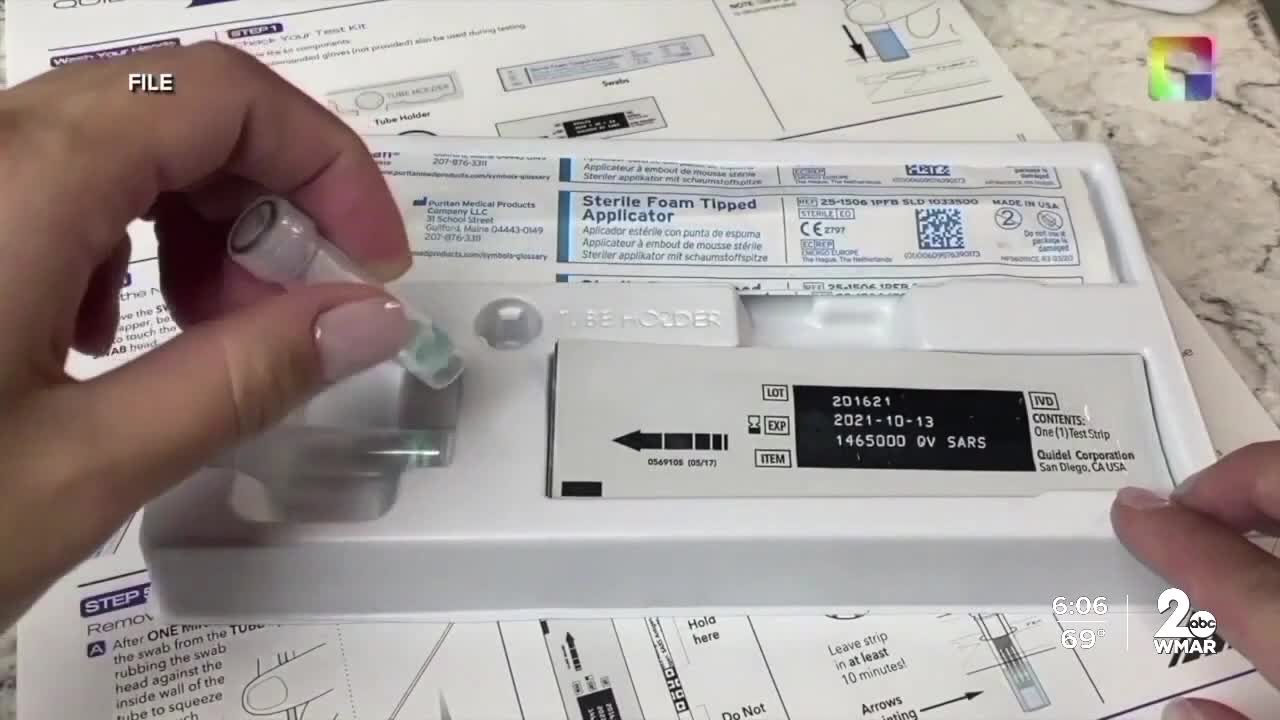BALTIMORE, Md. — Many people are still waiting for their free at-home Covid tests to be delivered to their mailboxes.
The delivery of the at-home kits also comes with questions of when to use it and how reliable are the results.
Once your mail carrier delivers a free Covid test kit from the federal government, some may wonder when to crack open the box.
Anne Arundel County health officer Dr. Nilesh Kalyanaraman said “if you have symptoms, you should definitely test yourself. If you've been exposed to somebody with Covid, you should test yourself, about three to five days later, preferably closer to three.”
Dr. Kalyanaraman explained one difference between taking an at-home test and a PCR test is the timing.
“The at-home test is really good to say do you have Covid right now, and are you likely to transmit it to others. The PCR test is really good at catching people when they first get Covid or even a few days or weeks afterward. Say you did have Covid, the at-home test isn't going to catch that,” Kalyanaraman said.
Johns Hopkins University assistant professor of medicine Dr. Zishan Siddiqui believes getting the rapid tests in the hands of everyone who wants one has a public health benefit, whether people have symptoms or not.
“If you can get these tests in asymptomatic individuals, and then perhaps test themselves serially, and detect 70 percent of the cases, then these individuals who would have been out and about otherwise would now be quarantining,” Siddiqui said.
Dr. Siddiqui also serves as the chief medical officer at the state field hospital in BATaltimore.
He conducted two studies here at the Baltimore Convention Center site to determine the accuracy of rapid antigen tests compared to PCR tests.
“For symptomatics, when we did our adult patient study which was last year, it detected about 87 to 89 percent of the cases that were picked up by PCR. And for the asymptomatic, it was closer to 70 percent which is also, still a pretty good number,” Siddiqui said.
Test result studies vary. Dr. Siddiqui did a second study during the Delta surge, but with children. He found rapid tests matched up to 90 percent of the PCR test results for both asymptomatic and symptomatic cases.
It also means at least 10 percent of the cases that tested positive with a PCR test, received a false negative result from a rapid test.
“Don't take a negative result as a license to remove masks, stop social distancing, but you continue those practices, and then use this as an added tool, where if you're positive, then you isolate yourself. And, if you're early in your course and you're symptomatic, you can seek care based on that,” Siddiqui said.
While people can self-report their at-home results online, it will be difficult for state and local health departments to keep a complete count of everyone who tests positive as many opt for the convenience of testing themselves for Covid at home.
“It's good information to have. It’s far more important to that people can actually test easily. I’d much rather have somebody be able to walk through the medicine cabinet, get tested and know in 20 minutes and do something about that,” Kalyanaraman said.
Dr. Siddiqui is conducting a third study here at state center field hospital in Baltimore.
With his latest study, he's looking at how accurate are rapid test results when people do the test on their own.
The Biden administration promised to home deliver the test kits by the end of January.
So far, about 50 million American households have received a free at-home Covid test in the mail but millions more are still waiting for them to be delivered.
The U.S. Postal Service says due to high demand, they're fulfilling the orders as they come in.
Free At-Home COVID-19 Tests may be ordered here.
Positive test results may be self-reported using the Maryland COVID Positive At-Home Test Report Portal.




